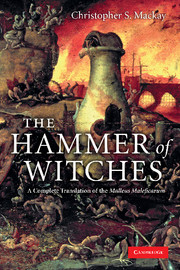Book contents
- Frontmatter
- Dedication
- Contents
- Map
- Introduction
- THE HAMMER OF WITCHES
- Structure of the text
- Author's Justification of the “Hammer for Sorceresses”
- Text of the Apostolic Bull
- Approbation and Signatures of the Doctors of the Illustrious University of Cologne
- PART I
- Question 1
- Question 2
- Question 3
- Question 4
- Question 5
- Question 6
- Question 7
- Question 8
- Question 9
- Question 10
- Question 11
- Question 12
- Question 13
- Question 14
- Question 15
- Question 16
- Question 17
- Question 18
- PART II
Question 13
from PART I
Published online by Cambridge University Press: 05 August 2015
- Frontmatter
- Dedication
- Contents
- Map
- Introduction
- THE HAMMER OF WITCHES
- Structure of the text
- Author's Justification of the “Hammer for Sorceresses”
- Text of the Apostolic Bull
- Approbation and Signatures of the Doctors of the Illustrious University of Cologne
- PART I
- Question 1
- Question 2
- Question 3
- Question 4
- Question 5
- Question 6
- Question 7
- Question 8
- Question 9
- Question 10
- Question 11
- Question 12
- Question 13
- Question 14
- Question 15
- Question 16
- Question 17
- Question 18
- PART II
Summary
THE second question (and at the same time proposition) is that it was just for God to permit certain angelic creations, whom He could not have made without their being able to sin, to sin in fact | and to save certain creations that were created in a similar way with Grace (without any previous temptation), and that it was just for Him to permit man both to be tempted and to sin. All these ideas are explained as follows.
It is an element of divine providence that every single thing should be left in its own nature and not at all impeded in its natural works, because, as Dionysius says, “Providence promotes not the ruination of nature but its salvation” (Divine Names, Ch. 4 [4.33]). If this is granted, then since it is obvious that, in the same way that the good of the race is more divine than the good of one person ([Nicomachean] Ethics, Bk. 1 [1.1]), the good of the universe surpasses the individual good of each nature created in the individual sense, it is also necessary to realize that if sin were altogether impeded, many levels of perfection would be thereby removed, since the nature that could sin and not sin would be removed. If this is said, man would nonetheless have been able to, as a result of the condition of his nature, as was discussed before.
Response. If no sin had followed in action but immediate Confirmation had instead, then it would always be unclear what was owed to Grace in connection with good deeds towards God and what ability the power to sin had had, and many other things whose removal would certainly cause a great loss to the world. It was also fitting that he should sin with no one giving a suggestion from outside but should instead take up the opportunity to sin by himself, which he in fact did when he wished to be God's equal.
- Type
- Chapter
- Information
- The Hammer of WitchesA Complete Translation of the Malleus Maleficarum, pp. 222 - 227Publisher: Cambridge University PressPrint publication year: 2009



